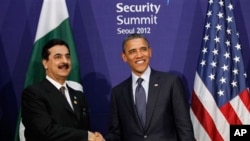U.S. President Barack Obama says he hopes that Pakistan's review of its ties with the United States will be balanced and respect not only Pakistan's sovereignty but also U.S. security needs.
Mr. Obama spoke to reporters Tuesday shortly before holding private talks with Pakistani Prime Minister Yousuf Raza Gilani. The two leaders met on the sidelines of an international nuclear summit in Seoul.
The meeting came amid a breakdown in relations between Pakistan and the United States following the U.S. military raid that killed Osama bin Laden in northern Pakistan last May and the mistaken killing of 24 Pakistani troops during a NATO strike last November along the Afghan border.
U.S.-Pakistani relations since November:
- November - Immediately following the border strike, Pakistan shuts down NATO's two main Pakistani supply routes into Afghanistan and orders U.S. personnel to evacuate an air base.
- December 24 - Media reports surface that the Central Intelligence Agency temporarily suspended drone strikes targeting low-ranking militants in Pakistan to mend relations.
- January 23 - Pakistan's military rejects a U.S. claim that American forces acted in self-defense and with appropriate force after being fired upon by Pakistani forces months earlier.
- January 31 - President Barack Obama confirms that the United States uses drone strikes against militants in Pakistan. The Pakistani government calls the strikes "unlawful, counterproductive and hence unacceptable" despite their "tactical advantages."
- February 23 - Secretary of State Hillary Clinton meets with her Pakistani counterpart and calls for a resumption of formal contacts with Pakistan after Islamabad finishes its review of relations with Washington.
- March 1 - U.S. lawmaker introduces a non-binding resolution in the U.S. Congress calling for Baluchistan's secession, provoking a furious reaction from Pakistani politicians and media.
President Obama told Mr. Gilani "there have been times, I think we should be frank, in the last several months where those relations have experienced strains."
Mr. Gilani said Islamabad is committed to fighting against extremism and terrorism and wants stability and security in Afghanistan. He said "if there is a stability and peace in Afghanistan, there will be a stability and peace in Pakistan and the whole region."
The two leaders said they wanted to work together to achieve that goal.
The deadly strike that killed 24 Pakistani troops prompted Islamabad to shut its ground supply lines to NATO forces in Afghanistan and re-evaluate its ties with the United States.
On Tuesday, thousands of Islamist party members took to the streets of the Pakistani capital, Islamabad, demanding Pakistan not reopen its Afghan border to U.S. and NATO supplies.
A White House deputy national security advisor (Ben Rhodes) said Tuesday's meeting "made important progress in both sides being able to hear directly from one another about what their views are."
Pakistan's parliament adjourned Tuesday for a second consecutive day without debating the proposed terms of engagement with the U.S.. Opposition parties are unhappy with some of the review's recommendations.
Meanwhile, some of the parties allied with the ruling coalition say the government should instead focus on domestic issues, such as the ongoing violence in the city of Karachi, before debating foreign policy.
Local officials say at least eight people were killed in Karachi on Tuesday when violence erupted following the killing of a political activist and his brother. Protesters also set fire to more than 35 vehicles in Pakistan's economic hub. The victims were members of the Muttahida Qaumi Movement (MQM).
Karachi has a long history of political, ethnic and sectarian violence.




